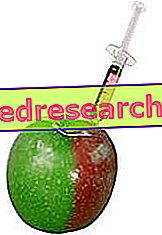What are Corn Flakes
Corn Flakes (in Italian: corn flakes) are foods of vegetable origin based on industrially processed large Turkish.

Today, corn flakes are foods produced by numerous companies spread all over the world, but the original Corn Flakes production patent (at the beginning: Granose ) was filed back in May 31, 1895 by John Harvey Kellogg (publication of 14 April 1896).
History of Corn Flakes
the discovery of the Corn Flakes dates back to the 19th century AD; in this period, a group of researchers belonging to the "Seventh-day Adventist doctrine" sought some vegetarian-type recipes (food philosophy imposed by the doctrine itself), with which to vary and broaden the diet of patients admitted to the sanatorium (project: " The Battle Creek Sanitarium in Michigan "). The project superintendent was indeed John Harvey Kellogg.
Being engaged in collateral activities, John Harvey Kellogg and his younger brother forgot about corn cooked in the open air, involuntarily leaving it to acquire the typical gumminess of stale foods. For budgetary reasons, the Kellogg brothers decided to use this raw material anyway and, making it pass through the rollers in the hope of obtaining a dough, they simply obtained crushed seeds. As a connoisseur of the "cracker" and the "Graham bread" (as well as the follower of their inventor: Sylvester Graham), John Harvey Kellogg decided to serve these toasted and crunchy flakes, natural as he abhorred any form of sweetening or spiciness (deemed inducer) of temptations); thus the first Corn Flakes were born.
Nutritional composition per 100g of Cornflakes - Reference values of the Food Composition Tables - INRAN | ||||||||||||||||||||||||||||||||||||||||||||||||||||||||||||||||||||||||||||||||||||
 | ||||||||||||||||||||||||||||||||||||||||||||||||||||||||||||||||||||||||||||||||||||
Nutritional values (per 100 g of edible portion) | ||||||||||||||||||||||||||||||||||||||||||||||||||||||||||||||||||||||||||||||||||||
| ||||||||||||||||||||||||||||||||||||||||||||||||||||||||||||||||||||||||||||||||||||
Subsequently, the younger brother (Will Keith Kellogg), as well as commercial director of the sanatorium, noting a high approval rating of the Corn Flakes among patients, decided to place them on the global market through the newly formed "Battle Creek Toasted Corn Flake Company". The success was immediate, even if the addition of other ingredients (including sugar) was a cause of rupture between the two brothers. Another success of the homonymous company was "Rice Krispies", marketed in 1928.
Nutritional properties
Corn Flakes are foods belonging to the III group of foods and their nutritional function is mainly to provide complex carbohydrates, therefore energy. In addition to carbohydrates, Corn Flakes contain excellent amounts of dietary fiber, while proteins and even more lipids are supplied in doses to say the least contained.
The overall energy intake of the Corn Flakes is quite high (greater than the dry pasta), but it is necessary to specify that the relative consumption portions are rather moderate (from 30 to 60g). At the same time, the glycemic index of the Corn Flakes is quite high, even though, since they tend to be taken by immersion in cow's milk or fruit juice, they acquire a much slower rate of digestion and absorption.
Corn Flakes are foods commonly used in the hypocaloric diet (against overweight) and in that against hypercholesterolemia, but in the right portions are also contextualized in the diet of other metabolic pathologies. However, with a more accurate analysis, a sensitive sodium content emerges, an unwanted element for those suffering from arterial hypertension or having a high cardiovascular risk. In this regard, a type of low-sodium Corn Flakes has recently been marketed, ie without added salt.
Also from the saline point of view, the Corn Flakes reveal an excellent iron and calcium content, while as far as vitamins are concerned, both thiamine (vitamin B1) and niacin (vitamin PP) and riboflavin ( vitamin B2).
NB . In the case of integral Corn Flakes it is also possible to benefit from a greater magnesium and dietary fiber content.
Desert Roses Without Butter
X Problems with video playback? Reload from YouTube Go to Video Page Go to Video Recipes Section Watch the video on youtube



